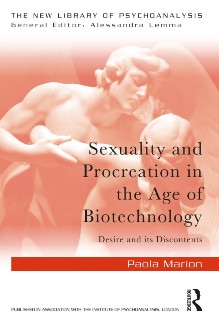
sexuality-and-procreation-in-the-age-of-biotechnology-di-p-marion
Sexuality and Procreation in the Age of Biotechnology
Desire and its Discontents
Paola Marion
The New Library of Psychoanalysis
General Editor: Alessandra Lemma
Routledge
2021

“What happens when procreation is no more ‘only’ the combination between a man and a woman, since the ‘cold third’ of technology brings something else and/or someone else into the process which generates a new human being? When other genetic material than the one of the couple (or at least, material treated by a medical figure) enters the Freudian primal scene? And what with the new homosexual or sexually polymorphic parenthoods? Paola Marion masterfully investigates these crucial points from an updated and deeply integrative psychoanalytic perspective.”
Stefano Bolognini, Past President of the International Psychoanalytic Association
“This is an important book because it illuminates a difficult and controversial development. Paola Marion discusses psychoanalytic theory as it relates to the scandal of sexuality in the light of modern conceptions, addressing the problems posed by the present time, including not only the new forms of procreation but also the cruxes faced by current society in terms of the evolution of sexuality such as the queer and the transgender. These new forms of identity constitute a real challenge for psychoanalysts whose clinical practice compels them to question their own theories.”
Anna Maria Nicolò, Past President of the Italian Psychoanalytic Society
Through the lens of psychoanalytic thought about sexuality, the book examines changes in the area of procreation and generation, the disjunction between sexuality and procreation introduced by biotechnology and some new methods of reproduction, and their impact on the essential moments of existence (birth, illness, death) and the most intimate aspects of personal identity (sexuality, procreation, body).
At the center of this book is the thesis that the disjunction between sexuality and procreation brought about by biotechnology represents a new scenario and introduces elements of discontinuity. What kind of effects on the individuals will the modifications introduced by biotechnologies in the field of procreation have? How can these changes affect even the most profound aspects of personal identity, including body and sexuality? How might they interfere with the sphere of desire? The book investigates the new scenarios and the consequences which are emerging, such as an alteration of personal boundaries, both in spatial and temporal terms, which is reflected in our way of thinking about ourselves and our relationships and the assertion of an unconscious fantasy that the limits imposed by sexuality and death can be surpassed. Offering a psychoanalytic reading of changes introduced in this field, this book will appeal to training and practicing psychoanalysts, as well as philosophers, psychologists and gynaecologists.
Paola Marion is a Training and Supervising Analyst for the Italian Psychoanalytic Society and a Child and Adolescent Psychoanalyst. She is past Chair of the IPA Outreach Committee for Europe (2011-2013) and past Editor (2017-2021) of the Rivista Italiana di Psicoanalisi. She has published papers in the International Journal of Psychoanalysis (IJP), and other reviews and collections.
(Tratto dalla quarta di copertina)

Attraverso la lente del pensiero psicoanalitico sulla sessualità, il libro prende in esame i cambiamenti che sono avvenuti nell’area della procreazione a seguito della disgiunzione tra sessualità e atto procreativo introdotta dalle biotecnologie e dai nuovi modi di generare. Tutto ciò si riflette sui momenti essenziali dell’esistenza (nascita, malattia, morte) e sugli aspetti più intimi dell’identità personale (sessualità, corpo, procreazione).
Al centro del libro la tesi che la disgiunzione tra sessualità e procreazione, dove si verifica come conseguenza dell’intervento biotecnologico, apra un nuovo scenario e introduca elementi di discontinuità. Quale influenza hanno sugli individui queste modificazioni nel campo della procreazione e generazione? In che modo queste innovazioni sono destinate a influenzare anche gli aspetti più profondi dell’identità personale, incidendo sul nostro rapporto con il corpo e con la sessualità? E come interferiscono con la sfera del desiderio e con l’idea stessa di piacere? Il libro affronta e discute i nuovi scenari e le conseguenze che stanno emergendo, come quelle di un’alterazione dei confini personali sia in termini spaziali che temporali. Ciò si riflette sia nel nostro modo di pensarci e di pensare alla relazione, sia nell’alimentare una fantasia inconscia che i limiti imposti dalla sessualità e dalla morte possono essere travalicati.
Offrendo una lettura psicoanalitica dei cambiamenti avvenuti in questo ambito, il libro si rivolge a psicoanalisti, filosofi, psicologi.
Paola Marion è Analista con Funzioni di Training della Società Psicoanalitica Italiana e Analista di Bambini e Adolescenti. È stata Chair dell’IPA Outreach Committee per l’Europa (2011-2013), e Direttore della Rivista di Psicoanalisi (2017-2021). Ha pubblicato sull’International Journal of Psychoanalysis, in altre riviste e libri collettanei.
“Cosa succede quando la procreazione non è più “solo” l’accoppiamento tra un uomo e una donna, e il “freddo elemento terzo” della tecnologia introduce qualcosa d’altro e/o qualcun altro nel processo di procreazione di un nuovo essere umano? Quando altro materiale genetico rispetto a quello della coppia (o quanto meno materiale trattato da una figura medica) entra nella freudiana scena primaria? E cosa succede con le nuove forme di genitorialità omosessuale e con la sessualità polimorfa? Paola Marion affronta magistralmente questi punti cruciali attraverso una prospettiva psicoanalitica aggiornata e profondamente integrata”.
Stefano Bolognini. Past President of IPA (Intenational Psychoanlytic Association).
Questo libro è importante perché illumina un’evoluzione difficile e controversa. Paola Marion discute, alla luce delle moderne concezioni, la teoria psicoanalitica in relazione allo scandalo della sessualità, affrontando i problemi posti dal tempo presente, non solo per quanto riguarda le nuove forme di procreazione, ma anche per quanto riguarda i nodi di fronte ai quali è posta la società relativamente all’evoluzione della sessualità nelle forme queer e transgender. Queste nuove forme di identità costituiscono una vera e propria sfida per gli psicoanalisti, la cui pratica clinica li obbliga a interrogarsi sulle proprie teorie”.
Anna Maria Nicolò. Past President Società Psicoanalitica Italiana.
